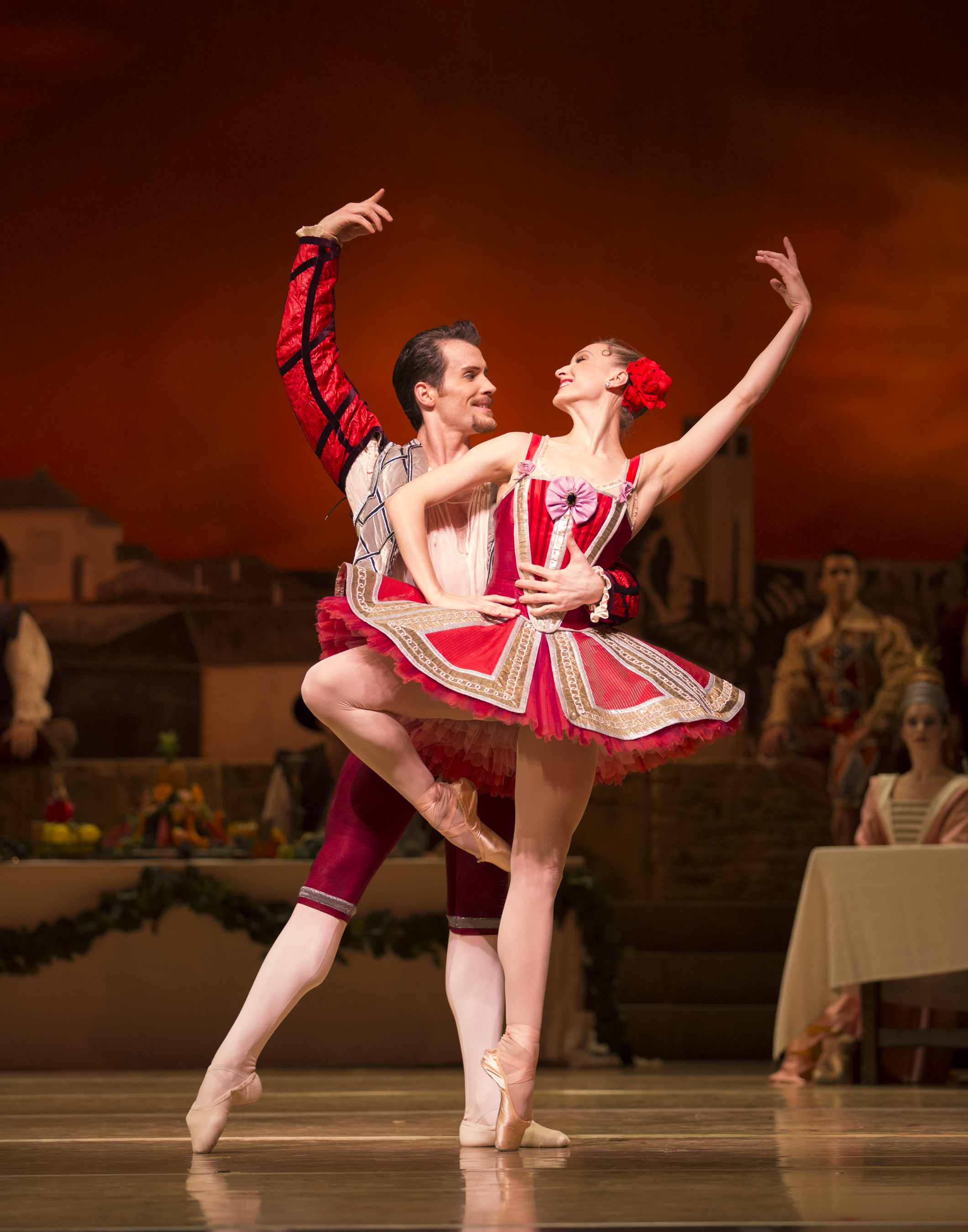Opening Nights
PDon Quixote
McCaw Hall, 321 Mercer St. (Seattle Center), 441-2424. $30–$184. Runs Thurs.–Sun. See pnb.org for schedule. Ends Feb. 8.
There is nothing subtle about Don Quixote. The Spanish-inflected dancing (full of big virtuoso tricks), the thumping rhythms in the score, and the lavish theatrical byplay almost jump off the stage and into your lap. By the time Marius Petipa made the entertainment in 1869, using a minor subplot from Cervantes’ novel, he was becoming an expert at transferring exotic locales or characters into the structures of classical ballet. And while many contemporary productions have streamlined the storytelling and cut back on the mime, Pacific Northwest Ballet’s 2012 version, first staged by Alexei Ratmansky, restores a big helping of the original details. It’s a work packed full of bravura roles for multiple dancers and a selection of meaty character-acting parts to move the story along.
Kitri, the innkeeper’s daughter, is in love with the barber Basilio, but her father wants her to marry another, richer man. After some adventures in the countryside for them and for Don Quixote, the two lovers manage to trick her father into blessing their marriage, and the wedding celebration fills the last act with the kind of technical challenges that Petipa adored.
Several dancers are returning to roles they’ve performed before; there are some major debuts, too. Carla Korbes is back as Kitri, this time with Batkhurel Bold as Basilio, and the two obviously relish building on their previous performances. Korbes is at that sweet spot in her career where she has both technical and interpretive skills, so that she can imagine what is possible—and accomplish it. Bold shares her confidence, giving one of his best performances, his formidable power balanced with buoyant enthusiasm.
Two other couples alternate in the lead roles: Lindsi Dec adds Kitri to her repertory, dancing with her husband Karel Cruz. It’s a pleasure to see their personal relationship bolstering their performance: Dec dances this challenging role with a veteran’s aplomb, while Cruz’s usual noble style and smooth technique are consistent. Another Basilio, Seth Orza, returns from a knee injury and rehab with attack intact, relishing his time onstage. Elizabeth Murphy takes a step forward to match his zest as Kitri.
Petipa was known for creating many smaller parts for dancers at all points in their careers. Carli Samuelson has incredible snap as Cupid, dancing the highly mannered solo with great integrity. Sarah Ricard Orza demonstrates real versatility by shifting from the smoldering street dancer Mercedes (during the matinee) to the graceful Queen of the Dryads (that evening). And Leta Biasucci and Angelica Generosa pounce on the choreography for Kitri’s friends, making some really difficult material seem like a game.
Non-dancing actors Allen Galli and Tom Skerritt return to their roles as Sancho Panza and Don Quixote, respectively. Skerritt’s more naturalistic style contrasts with Galli’s, whose background in commedia dell’arte and physical comedy makes his Sancho a wonderful straight man. Their presence bookends the production, so that at the end of the ballet we wonder where they might be going next and what adventures they might find. SANDRA KURTZ
Humble Boy
Seattle Public Theater at the Bathhouse, 7312 W. Greenlake Dr. N., 524-1300, seattle publictheater.org. $5–$32. 7:30 p.m. Thurs.–Sat., 2 p.m. Sun. Ends Feb. 15.
English playwright Charlotte Jones’ 2001 comedy is like a dazzling yet oddly odorless rose, lovely in concept though strangely unsatisfactory. I ache to adore it, yet I also crave something more.
Loosely lifted from Hamlet, Humble Boy starts with pantywaist astrophysicist Felix Humble (Jason Marr) returning home for his father’s funeral. There his vainglorious mother Flora (Macall Gordon) has rid their countryside house of her late husband’s belongings, including a beloved batch of bees. Moreover, even before his death, she took up with boorish neighbor George Pye (Mike Dooly). (If they get married, it will make her Humble-Pye.) From there, Jones explores love, loss, and letting go of the past via much passive-aggressive arguing and humor. Excursions into physics and references to Stephen Hawking’s “theory of everything” also give the proceedings a brainy, Stoppardian tinge.
Director Marcus Goodwin matches the show’s design elements like companion plants at Kubota Garden. Richard Schaefer’s sumptuous green set suggests tea and cucumber sandwiches in the Cotswolds. Candace Frank’s comely costumes capture every character component: When Felix attends a family (dys)function, his too-small suit and garish wide tie—belonging to his dead dad—indicate his profound apprehension.
Goodwin’s artfully arranged cast also includes Alyssa Keene as the brazen Rosie (George’s daughter, also Felix’s former girlfriend). Particularly funny is a scene in which she sympathetically suggests ex-sex with Felix to clear his mind of mundane moral choices, scholastic suspicions, and humdrum mama drama. Instead of worrying about superstring theory, why not make like the birds and bees? No less effective is Dooly, who encourages such contempt for George that I cheered his comic comeuppance.
Yet despite the heirloom seeds of talent here, the script’s soil is unstable. Jones’ long first act languishes with lagniappe language; then the second shifts to amusing alacrity. Also, I was left digging for exposition. Felix has ringing in his ears . . . why? Is this important? Is he blooming mad like Hamlet, or what?
One could go on forever with the gardening, floral, and apiary metaphors. Goodwin (and Jones) create an elegant topiary maze, but it ultimately leads to a feeling of meh. If Hamlet was ineluctable tragedy, Humble Boy is more ragged, unkempt comedy. For a better treatment of science and tangled family tumult, there’s Stoppard’s Arcadia, Michael Frayn’s Copenhagen, or David Auburn’s Proof—the 2005 filmed version of which is probably available on Netflix. ALYSSA DYKSTERHOUSE
E
stage@seattleweekly.com




